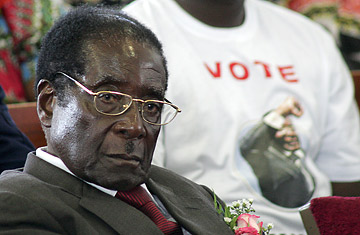
Robert Mugabe, leader of Zimbabwe's ruling party ZANU-PF, attends a church service in Bulawayo.
Zimbabwe's President Robert Mugabe may not be ready to give up power any time soon, according to one of his former confidantes. The country remains in the limbo of an uncertain post-election moment, as Mugabe's party lost the parliamentary vote in last weekend's balloting, while the presidential tally has not yet been released. On Thursday, CNN reported opposition claims that a crackdown had begun that included the arrest of journalists.
Jonathan Moyo, a former Information Minister in Mugabe's government but now one of the regime's fiercest critics, suggests that Mugabe is not in any hurry to leave office. He spoke to TIME in an interview following an address to the National Press Club in Harare on Wednesday. As members of Mugabe's party close ranks around their beleaguered president and suggest that he will face off with opposition leader Morgan Tsvangirai in a runoff, Moyo, 51, may be one of the few people with insight into Mugabe's thinking and a willingness to share it.
"[Mugabe] has lived and ruled from an ivory tower, and that is his problem," says Moyo, who says he last spoke with Mugabe on February 17, 2005. "Obviously he believes people love him and [the election result] is a new reality check. I don't know whether that reality check will make him understand that the people have taken the decision to vote against him on their own. He'll explain it by external influences, but he will find it very difficult to understand that people have made their choices."
Despite the election results, Moyo says, Mugabe is likely to seek a way to hang on to power. "He has to be mindful of the law as it stands," the former Information Minister explains. "I personally think the president is going to invoke presidential powers to extend the run-off period from 21 days to 90 days or more, claiming that the government is broke and doesn't have the money to pay for the run-off. Parliament is not there to appraise the costs so presidential powers will be used to extend or postpone the vote. That will bring more time to think through his future policy and help develop plans to work in his favor."
At the same time, Moyo says that some of those around Mugabe — "technocrats, mostly" — are advising the president to stand down.
Last week's election, which saw Mugabe's ruling Zanu-PF party lose control of the legislature for the first time in Zimbabwe's history, also returned Moyo, a controversial figure widely viewed as the consummate 'flip-flop' politician, as the country's lone independent member of parliament. Moyo is best known for initiating the country's most draconian press laws during his tenure as Information Minister — which made his appearance at the National Press Club somewhat ironic. Moyo served in the position from 2000 until he was sacked five years later.
Moyo is optimistic that a runoff election would seal the defeat of his former boss. "It's about a new start for Zimbabwe and new hope," he says. "We want to participate in international affairs and continental bodies."
Still, Moyo expresses a desire that Mugabe's legacy will not be entirely wiped out. "We must respect Mugabe for what he has done for this country," says Moyo. "He led us to liberation and has been all our leader, so we must not destroy his reputation." And that, argues Moyo, should shape Mugabe's fate. "Whatever people think about him, he is a father figure and must be given respect when he departs."
